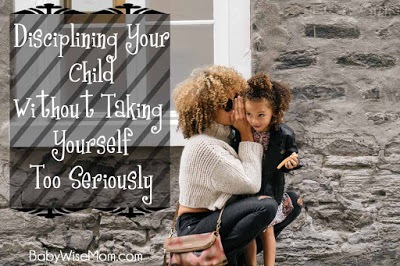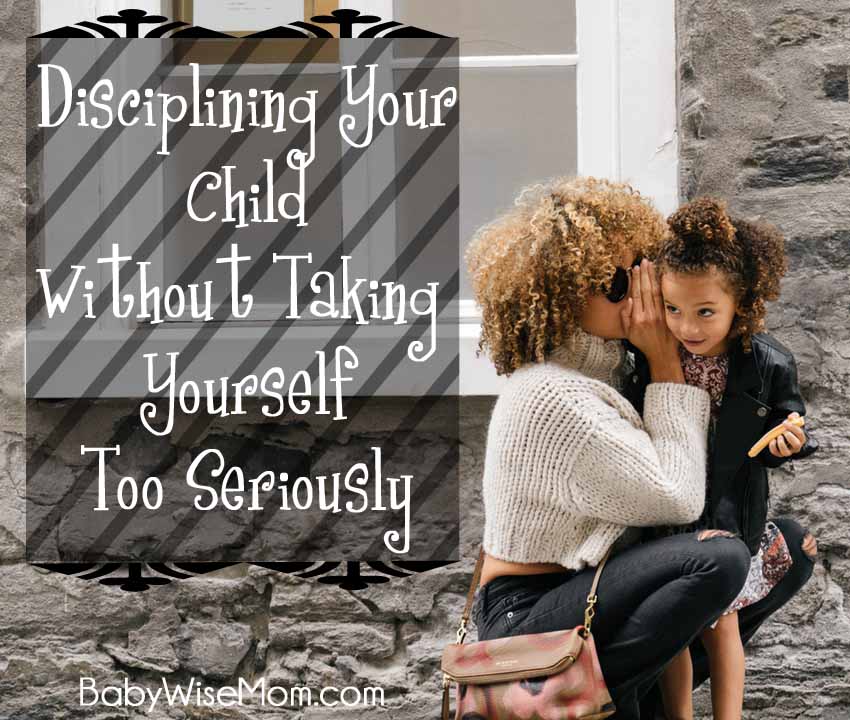Most of us want children who are respectful to us and to those around them. We want our children to obey us the first time without backtalk and sass. We want children who will respect authority figures and follow the rules.
These are all worthy goals. We can at times, however, take ourselves and the situation far too seriously when our children make mistakes. We can hold them to higher standards than we even hold ourselves to at the same moment. Here are some things to remember when you are disciplining.
Your Child Isn’t Trying to Make You Mad (usually)
Most of the time, your child is making mistakes because your child is a child (see below). It isn’t an attempt to make you mad. Now, I know sometimes children do things just to make you mad. Your child is mad and wants you mad, also. If you find this happening often, you are most likely responding emotionally rather than rationally. Respond calmly and keep your cool. Don’t take things personally. Don’t take yourself so seriously that you think your child’s behavior revolves around you. Your child makes mistakes without taking you into consideration.
Your Child is a Child
Your child is a child and will therefore make mistakes, and a lot of them. Think of all of the mistakes you make on a daily basis. Do not take yourself so seriously that you forget to offer your child even more grace than you need daily. Do you lose your cool ever? Then of course your child will. Help navigate your child through the moments your child needs correction, but don’t freak out that your child made a wrong choice or gave into passions instead of controlling herself perfectly.
Your Child is Not A Personification of You
We can really feel like our children are a reflection on us as parents. Okay, in many ways that is true. But we can’t let fear of judgement from others drive our reactions when we are in a discipline situation. We can look at their behavior and think, “Hmmmm….I am clearly getting a little lazy in my reactions because my child thinks she has five chances to listen every time.” That is a good way to look at behavior and analyze your current efforts. The wrong way is to think, “Oh my child is making me look like the worst mother right now!”
Granted, other people can make this hard. We can and will get judged by other people. It is lame, but it does happen. You have to get to a place where you accept that and block out the haters. As you gain more experience as a parent, you will be better about ignoring the judging, but you won’t be immune.
Just last week, we were at the store. As we were in the checkout line, Brinley got upset because she had wanted to get something. We were actually at Walmart, and the last time she was at Walmart was when she and I went on a date there a few months back and she exchanged a duplicate gift for a new toy. She had an association in her head that Walmart meant new toy. When she realized we were checking out and she had no new toy, she got upset.
She started to cry and say she wanted something. Initially, I responded the way I always do to fits like that. “Sorry, sweetie. We aren’t getting a toy today.” Then I let her work through that emotion. No biggie.
Then I had this thought. The people around me were likely going to judge me based on my little three year old’s reaction. Here she was crying and saying, “I want something!” They are going to think I spoil her and that she can get what she wants by crying. The reason I had this thought was from reading a judging post on social media that talked about someone observing this in a child at the store. Surely other people would draw similar conclusions in this situation. My eyes darted to the candy in the aisle and I wondered what I could offer her to stop the crying.
It was fleeting, however. Luckily I quickly gathered my wits. I am not a person who gives into tantrums and crying. Not at all. I was in no way going to give her something to stop the crying. Let the people judge (if they were). Me trying to avoid their judgement would just be setting myself up for many more store tantrums in the future.
I looked her in the eye and calmly explained, “Sweetie, we don’t get a toy every time we come. We aren’t getting a toy today.” She pulled it together in less than 60 seconds (though it felt like more). Remember your child is a child and will have a tantrum in public at some point.
So be cautious that you do not let your fear of what others are thinking about you drive the discipline decisions you make. Do what you know is best in the situation even if you might get judged unfairly for doing so. It isn’t about you. It is about parenting your child.
You Are Still a Good Parent Even When Your Child Disobeys
Your child will disobey. Your child will have a melt-down at inopportune moments. Your child will make wrong choices. It just will happen. You are still a good parent even when these things happen. Don’t take life so seriously that you think everything needs to be perfect. Life isn’t perfect. You aren’t perfect. Your child is not perfect. Things will go poorly. That doesn’t mean life isn’t good, you aren’t good, or that your child isn’t good.
You Can Laugh About It (just don’t mock)
Learn to laugh things off. One time Brayden, as a two year old, wanted to continue playing a video game when it was time to turn it off. I explained it was time to stop. He threw his controller on the ground in anger. I explained to him that he would not get to play the next day since he chose to throw his controller on the ground. Oh he was upset! He threw himself upon his knees, put his hands together, and pleaded to play. My husband and I laughed then and we still laugh about it now.
Many times, if you can respond with a light heart, your child’s heart will lighten also. That doesn’t mean consequences don’to apply, but that you aren’t all grumpy about it.
Be cautious you don’t mock your child or publicly shame your child, though. Remember your child’s feelings are real. It may seem small to you, but the thing that is bringing your child’s world down around him is real to him. You can respond in a way that will help him see it isn’t really a big deal, but be careful you don’t do it in a way that invalidates his feelings.
Not All Consequences Need To Be Big
This is something you get a feel for over time. Not every infraction requires a big response from you. Sometimes all you need is the eye contact, the tilt of the head, and a slight shake “no.” Sometimes that is enough to set your child straight. Don’t take mistakes so seriously that you blow them out of proportion.
Conclusion
As you correct your child in life, remember to not take yourself too seriously. You can still apply consequences and expect improvement and keep things happy and positive.
Related Posts:


